电子助力转向系统设计

1.无需注册登录,支付后按照提示操作即可获取该资料.
2.资料以网页介绍的为准,下载后不会有水印.资料仅供学习参考之用.
密 惠 保
电子助力转向系统设计(选题审批表,开题报告,中期检查表,论文说明书20000字,CAD图14张)
摘 要:电子助力转向系统EPS(Electric Power—assisted Steering)是近几年迅速发展的一项汽车性能提升的新技术。电子助力转向系统由于采用了电子式控制的方式,因此响应速度快,可以按照行驶需要随时迅速的改变助力方式,使车辆在行驶过程中能获得最佳的向特性。本文从具体的项目实际出发,分析了目前应用较广泛的柱式电子助力转向系统的结构和工作原理,通过对EPS系统的动力学建模,确定了助力电机的助力特性,并通过计算机仿真,验证控制方法和控制策略对系统特性的作用。控制单元通过实时采集车速信号和扭矩传感器信号,经过控制算法分析确定并输出目标电流,通过H桥电路控制助力电机的转速和转矩,从而实现助力转向功能。
关键词:电子助力转向系统,传感器,模糊控制。
Design of the Electric Power Steering System
Abstract:Electric power steering system(Electric Power-assisted Steering)is a new technology to enhance vehicle performance which is in a rapid development in recent years .With the traditional and hydraulic power steering wheel torque signal and vehicle speed signal,the electronic controller connected to the power generated by the motor shaft direction and the size of the corresponding auxiliary Power to help turn the servo driver safety system easily.Electronic power steering system.Control the use of electronic means,so fast response can follow rapidly changing travel need help at any way,so that the vehicle in motion the process to get the best steering characteristics.This specific project from the reality of the current application of the broader electric power steering column structure and working principle of the system,through the EPS system dynamics modeling to determine the power characteristics of the motor power,and through computer simulation,Control method and control strategy validation of the role of system characteristics.Through the real-time signal acquisition the speed and torque sensor signal and through the control algorithm and use which to determine the current output through the H bridge circuit and control the power of the motor speed and torque,control unit achieves power steering function.
Key words:Electric Power—assisted Steering,Sensor,Fuzzy control.
本文的研究内容
本文研究的主要内容有:
(1)对EPS系统的结构进行分析,建立了助力转向系统的动力学模型。
(2)分析了电子助力转向系统的性能要求和试验方法。
(3)基于MC9SDGl28单片机的主控核心电路和驱动电路等硬件电路的实现。
(4)控制策略的选择和软件实现。
(5)分析了试验过程中遇到的影响EPS性能的因素,并给出试验结果。
电子助力转向系统这一课题的研究综合了控制科学与理论、汽车电子、机械设计、传感检测和电机学等多门学科知识,属于机电一体化系统。设计电子助力转向系统,首先需要考虑的就是系统应用中的转向轻便性、操控舒适性以及安全性。电子助力转向系统20世纪80年代提出时,起先由于受到电子技术,电机技术以及机械制造工艺的限制,发展十分缓慢。直到近几年,随着工业水平的大幅度提高,电子技术突飞猛进的发展以及新的控制理论的不断提出,汽车助力转向才正式开始向电子助力转向的方向上迈进[5]。各项新技术、新理论也在不断的提出。根据EPS的结构可以看出,EPS系统技术的关键可以分为硬件和软件两个方面。硬件方面要求传感器和电机必须满足要求;软件方面则要求能实现助力特性,并且能监测系统的工作状况
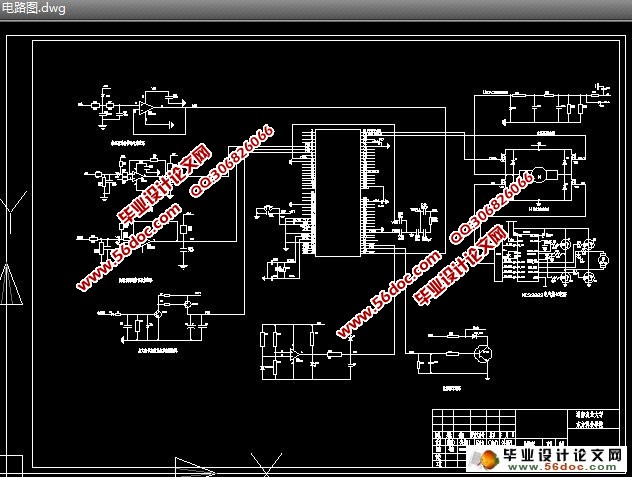
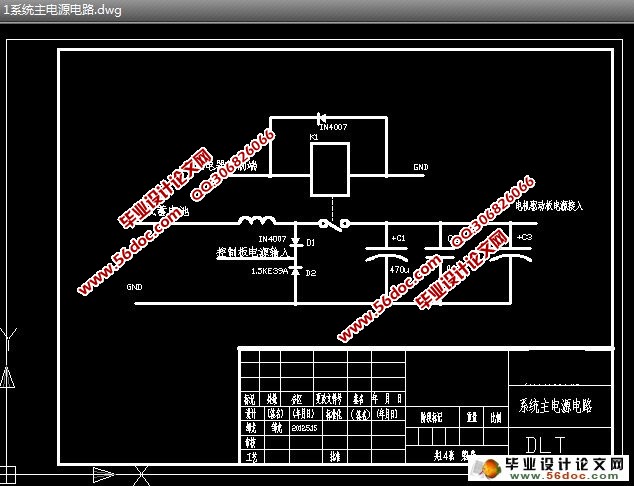
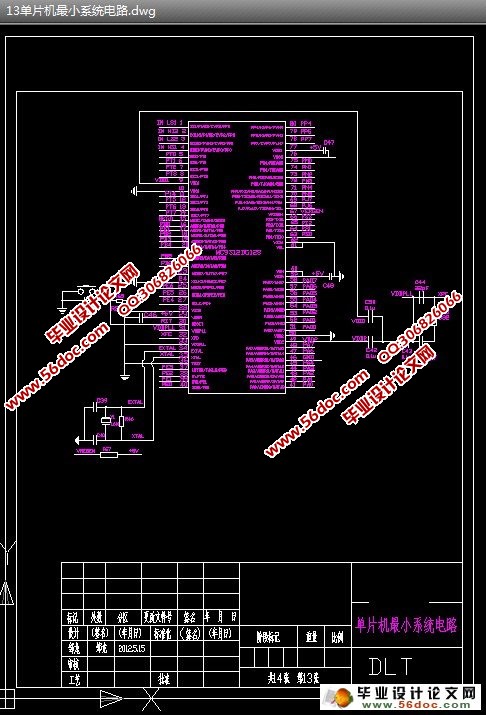
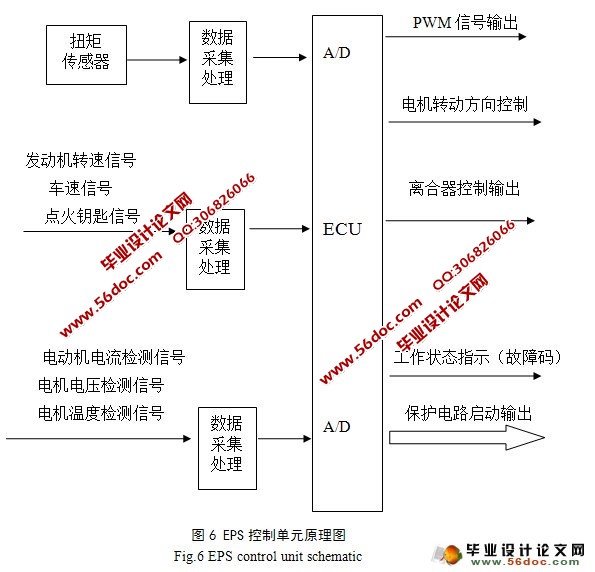
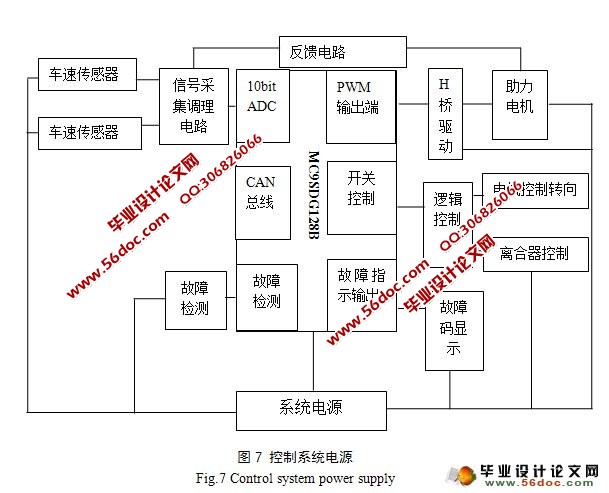 [版权所有:http://think58.com]
[版权所有:http://think58.com] 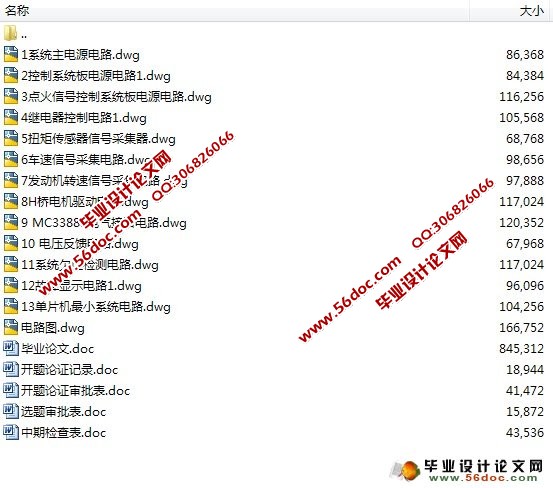
目 录
摘要 …………………………………………………………………………………1
关键词 ………………………………………………………………………………1
1 前言 ………………………………………………………………………………2 [资料来源:http://www.THINK58.com]
1.1 EPS 系统的结构和工作原理 ………………………………………………2
1.2 国内外研究现状 ……………………………………………………………3
1.3 本文的研究内容 ……………………………………………………………5
2 电子助力转向系统的关键技术 …………………………………………………5
2.1 电机驱动 …………………………………………………………………5 [版权所有:http://think58.com]
2.2 传感器 ………………………………………………………………………6
2.3 助力特性 ……………………………………………………………………6
2.4 控制方法 ……………………………………………………………………7
2.5 故障诊断和系统稳定性 ……………………………………………………7
2.6 整车性能匹配 ………………………………………………………………8 [来源:http://think58.com]
3 电子助力转向系统动力学方程 …………………………………………………8
3.1 机械部分建模 ………………………………………………………………9
3.2 电控部分建模 ………………………………………………………………14
3.2.1 阻尼控制 ………………………………………………………………14
3.2.2 回正控制 ………………………………………………………………14
3.2.3 EPS系统控制建模 ……………………………………………………15
4 ECU电路结构功能和控制策略……………………………………………………15
4.1 ECU工作原理 ………………………………………………………………15
4.2 硬件电路的设计 ……………………………………………………………16
4.2.1 电源电路 ……………………………………………………………17 [资料来源:http://THINK58.com]
4.2.2 ECU控制电路 …………………………………………………………19
4.2.3 电机驱动电路 ………………………………………………………21
4.3 电压反馈电路 ………………………………………………………………23
4.4 故障检测及报警电路 ………………………………………………………24
4.5 控制策略与软件设计 ………………………………………………………25
4.5.1 模糊控制 ……………………………………………………………26
4.5.2 软件设计 ……………………………………………………………29
5 EPS功能试验方法分析及要求 …………………………………………………32
6 总结与展望 ………………………………………………………………………33
6.1 总结 …………………………………………………………………………33 [版权所有:http://think58.com]
6.2 展望 …………………………………………………………………………33
参考文献 ……………………………………………………………………………34
致谢 …………………………………………………………………………………35
[资料来源:http://think58.com]
